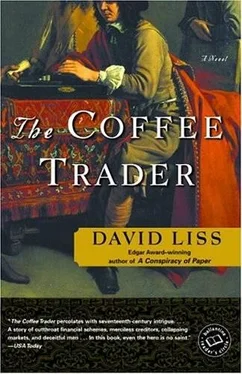“You are welcome to try, friend, but then you assume the risk. And when the world learns that you have unloaded your stock only hours before news of the loss becomes general, you will become mistrusted. I, on the other hand, do not spend much time upon the Exchange and can escape from such an adventure entirely unscathed.”
The man said nothing, but Miguel could see that he stood on the precipice of acquiescing.
“I might also add,” the prospective buyer told him, “that not every man might sell spoiled goods with an honest look in his eye. You might find yourself ready to sell and with no one to buy because you cannot conduct yourself like a man who has nothing to hide.”
“You, however, do a mighty good job of looking like an honest man,” a new voice, a heroic voice announced, “though as sure as I am standing here, I know you to be a scoundrel.”
And there was Hendrick, dressed in black like a man of business. He stood behind the prospective buyer with his arms crossed, and he appeared nothing if not heroic.
“I know you, Jan van der Dijt,” Hendrick announced, “and you are a liar and a knave.” He turned to the shareholder. “Nothing has befallen your ship, sir. These men are tricksters, who prey upon the fear of investors. They seek to rob you of your shares at half their value and then reap the rewards when the cargo arrives safely.”
The sailors and their companion rose from their seats and hurried out the door. The shareholder stiffened and looked as though he prepared himself to sprint after the cheats, but Hendrick put his arm around the man’s shoulders and held him back.
“Let the villains run,” he said soothingly. “You’ve undone their scheme, and you can’t defeat so large a group. Come.” He led the man to a table and applied pressure upon his shoulder so he would sit.
Miguel had just witnessed the precise events that had transpired when he had met Geertruid and become her friend. But their friendship was a sham and everything had been false. The men who had offered to buy his shares hadn’t been exposed by Geertruid, they had been in her employ. It had been no more than a trick to gain Miguel’s trust.
Making sure the fellow’s back was toward him, Miguel quickly paid his reckoning-indeed, he overpaid, that he might get out quickly and with little conversation. He then found the door and slipped out unseen.
Out in the cool night, he lit his lantern, which barely penetrated the thick fog off the IJ. What did it mean? How could he explain it?
In an instant, all became clear. Geertruid had laid some scheme that involved gaining his trust not for a single night at a single moment but over a period of days or weeks. Then Miguel had lost almost everything when sugar collapsed. Surely that explained why Hendrick appeared so uneasy around him-the man did not understand what Geertruid wanted with this Jew who had now become penniless and of no value to them.
So Geertruid had created value. She had hatched this coffee scheme in order to-to do what? What plot had she constructed? It could not be that Geertruid planned to take anything from Miguel. She had provided money, money that, by her own admission, did not truly belong to her.
Perhaps it did not belong to her late husband’s children either. That story, Miguel realized, had the hollow ring of a lie. How could he have not seen it sooner? He, who made his livelihood by distinguishing truth from falseness, though it was but a scurvy livelihood now. And coffee, which was to save him from his ruin, was now revealed to be but another disaster. But why? Why would Geertruid advance money, why would anyone advance money, to dupe a ruined man into ruining himself further?
There could be only one answer. There could be only one person willing to expend capital on Miguel’s destruction. Geertruid, he concluded with perfect clarity, served Solomon Parido.
The idea that one might see things more clearly upon a new day, or that matters of importance could be worked out during sleep, seemed to Miguel foolishness. His restless sleep offered him no answers the next day, nor the day thereafter, the Sabbath. On the following morning, however, he did wake up with one important detail on his mind: standing outside the Singing Carp, Joachim had spoken suggestively about Geertruid. He could remember the precise smell in the air-beer and piss and canal stink-as the wretch suggested he knew something.
At the time, Miguel had assumed Joachim had somehow learned about Geertruid’s money, but now Miguel thought that unlikely. The business with the husband’s children was almost certainly a lie, a plausible deception meant to sound like a dishonest but forgivable means of generating capital. Surely it was more likely that Solomon Parido had provided the money.
But if Geertruid did Parido’s work, why did the parnass not know the details of Miguel’s plans? Would Parido let Miguel and Geertruid obtain their monopoly on coffee and then strike, ruining Miguel for his partnership with Geertruid and splitting the proceeds?
“No,” Miguel said aloud. He sat upon his cupboard bed, throwing the heavy feather duvet aside in the morning heat. None of it made sense, but someone-Geertruid, Hendrick, Parido-someone would make a mistake that would reveal the truth, and he would be ready when they did.
Two days later, Annetje announced that Miguel had a visitor. Her voice quivered slightly, and she could not bring herself to meet Miguel’s eye. When he followed her out to the front room, he saw Joachim standing just inside the doorway, a new wide-brimmed cap in his hand, looking about the house with a kind of childlike curiosity: So, this is where a Jew lives.
“You’ve lost your mind,” Miguel said calmly.
Joachim wore new clothes-where had they come from?-and while they were not the finery he had once been used to, he presented himself neatly and with dignity, much like a tradesman in his white shirt, new doublet, and close-fitting woolen jersey. The wound on his face belied any hint of gentility, but it also made him less recognizably a mendicant, and he certainly no longer carried with him the stink of decay.
“I must speak with you,” he said, in an even voice Miguel hardly recognized. Had a bath and new clothes driven out his madness? “I’m already in your house. To cast me out now would do you no good, particularly if I made a great deal of noise about it. Surely you would be better off if I left quietly when my business is done.”
Could not the rascal have had the courtesy to knock upon the kitchen door? Miguel was not about to stand in the front of the house with this fellow, so he stepped aside and led the villain down to his cellar.
Joachim examined his surroundings as he descended the stairs and stood uneasily in the damp room, perhaps surprised that Miguel did not live in luxury. He sat on a stool with uneven legs and let a moment pass while he stared into the flame of the oil lamp upon the table. Finally he took a deep breath and began. “I have been under the influence of a lunacy that has now passed. I have made demands and issued threats, some of which may have been unreasonable, and for that I apologize. I still think I should be paid the five hundred guilders I lost, but it need not be immediately or all at once. That is to say, I would like to set upon a schedule of repayment, such as one might have if he took a loan. Then I’ll no longer bother you.”
“I see.” Miguel spoke slowly, trying to give himself time to think. Someone had provided Joachim with money; that much was evident. That someone could only be Parido.
“I’m glad you see, so on to business: I will accept a gradual repayment of what you owe, though in order for me to feel comfortable, I’ll have to know how you plan to make your money. So, you see, that’s the bargain. You tell me about this business project in which you plan to make money over the next few months and, understanding your strategy, I may feel confident that you will repay my five hundred guilders over, shall we say, the next two years.”
Читать дальше












